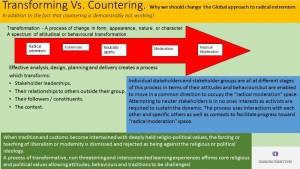This diagram contains important clues about an alternative to the widely held notion that religious extremism can be forcefully countered. It’s from Ian White, a key strategist behind the scene in stabilizing the Northern Ireland peace process.

Diagram by Ian White – more readable here – shows alternative to “countering” religion
Religion is deeply embedded in human experience. The goal in responding to religious extremism must be to work with and constructively engage the powerful energies of religion rather than to remove or thwart them, what White calls “countering”.
The latter rarely work out as expected. To the extent that strategies to counter extremism are violent, they share and strengthen the underlying assertion of extremism, that force is acceptable and effective in building a desirable future. Even when not violent, if such strategies fail to engage religious leaders, they are devoid of understanding of the world from which extremism emerges; and thus bereft of potency and sustainability.
Transformation: A Sustainable Response to Extremism
The only option for responding to religious extremism without making things ultimately worse is a strategy of transformation.
Such a strategy works respectfully and knowledgeably in regard to the role religion holds in human functioning and it engages religious people where they are. It actively seeks out and finds common cause with those values, symbols, traditions, individuals and institutions that support non-violent responses to human diversity; responses that exist in virtually all religious milieu, even if not always apparent from a distance.
Because the only realistic goal is transformation, not transmission or domination, such an approach must be a dialogue, not a monologue.
With no exceptions, all who travel and engage the world participate in and benefit from systems that are violent and oppressive. There is no such thing as fully peace-creating people engaging others in need of enlightenment. The best we can hope for is to step forward as still-struggling, partially blind people, committed nevertheless to working actively with others to improve ourselves, our communities, and our world.
And that’s enough. From such a stance we have sufficient credibility that we will find and engage those with a similar stance in other communities. Together with them, we can find transformative responses, things that will change both them and us in constructive, sustainable ways.
Ask Ian White, who quietly called into life and coordinated such an approach in Northern Ireland.
Author Ron Kraybill has worked in peace processes in the US, Israel/Palestine, Northern Ireland, South Africa, the Philippines, Myanmar, and other locations and blogs at www.KraybillTable.com.

